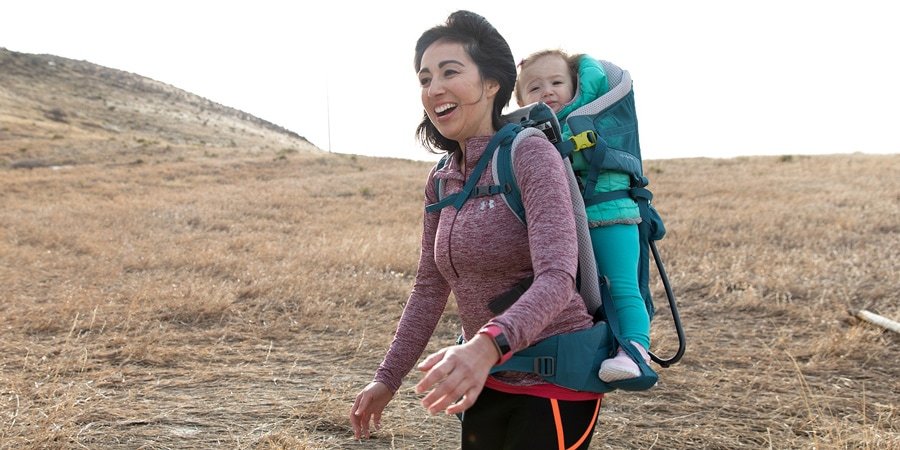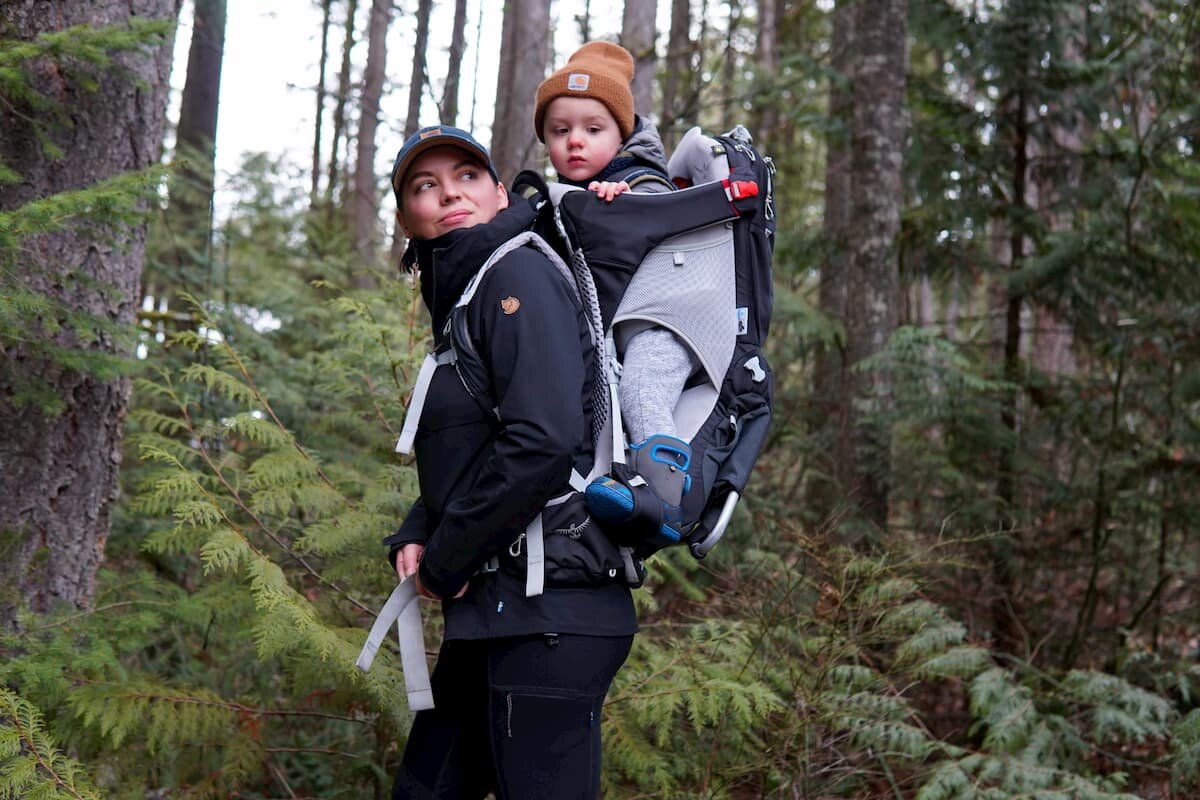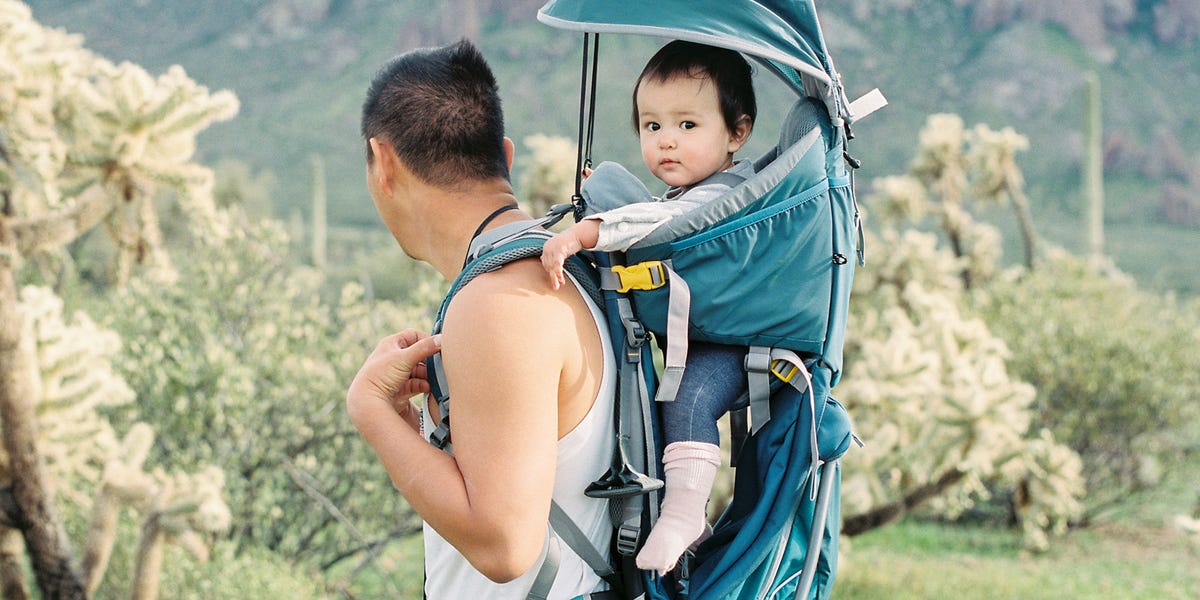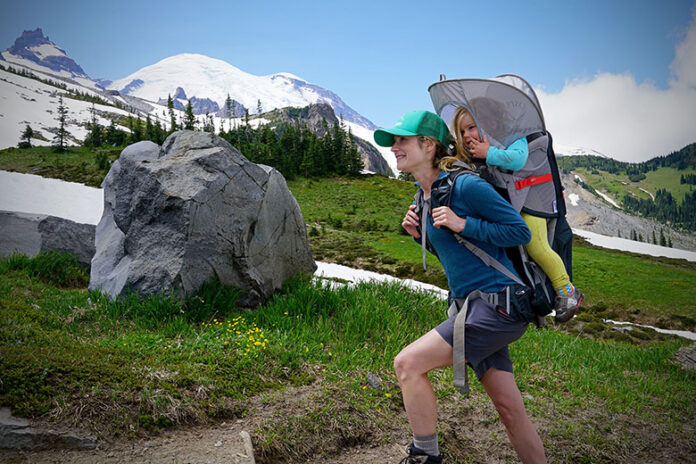For the best hiking child carrier, consider the Deuter Kid Comfort or the Osprey Poco Plus. These carriers offer comfort and versatility for your outdoor adventures.
With features like rain and sun protection, they ensure a pleasant experience for you and your child on the trails. The Deuter Kid Comfort is the top choice overall, while the Osprey Poco Plus provides extra storage. If you’re on a budget, the Luvdbaby Premium Baby Backpack Carrier is a great option, offering quality at an affordable price.
For short hikes and travel, the compact Osprey Poco LT is a convenient choice. Whether you’re planning a day trip or a longer overnight adventure, a reliable child carrier is essential for comfortable and safe hiking with your little one.
Introduction To Hiking Child Carriers
Hiking child carriers are specially designed backpacks that allow parents to carry their young children comfortably during outdoor adventures. These carriers provide a safe and secure way to bring your little one along on hiking trips, nature walks, and other outdoor activities.
Benefits Of Using Hiking Child Carriers
- Ease of carrying your child while keeping your hands free for navigating rough terrain.
- Comfortable seating and support for your child, ensuring they can enjoy the adventure too.
- Adjustable straps and features for a personalized fit and enhanced safety.
- Sturdy construction to withstand various weather conditions and rugged landscapes.
- Convenient storage compartments for carrying essentials like snacks, water, and extra clothing.
Considerations When Choosing A Hiking Child Carrier
- Weight capacity: Ensure the carrier can support your child’s weight comfortably.
- Comfort for both child and wearer: Look for padded straps and adjustable features.
- Safety features: Choose carriers with secure harness systems and sturdy frames.
- Weather protection: Opt for carriers with sunshades, rain covers, or weather-resistant materials.
- Storage options: Consider the size and accessibility of compartments for your essentials.

Credit: www.rei.com
Top Picks For Hiking Child Carriers
When it comes to hiking with your little one, having a reliable child carrier can make all the difference. We have compiled a list of top picks for hiking child carriers to help you find the most suitable option for your outdoor adventures.
Deuter Kid Comfort
The Deuter Kid Comfort child carrier is a top choice for parents who prioritize comfort and safety. With its adjustable suspension system and ample storage space, this carrier ensures a smooth and enjoyable hiking experience for both parent and child.
Osprey Poco Plus
The Osprey Poco Plus child carrier is designed for ultimate comfort and versatility. Featuring a breathable back panel and a hydration sleeve, this carrier allows you to stay hydrated while enjoying the great outdoors with your little one.
Kelty Journey Perfectfit Elite
The Kelty Journey PerfectFIT Elite child carrier is ideal for families who seek durability and functionality. Equipped with an adjustable seat and sunshade, this carrier provides a comfortable and secure environment for your child during long hikes.
Luvdbaby Premium Baby Backpack
The Luvdbaby Premium Baby Backpack is a reliable choice for parents who value convenience and practicality. With its lightweight design and multiple pockets, this carrier offers ease of use and ample storage for essential hiking gear.
What Makes A Great Hiking Child Carrier
A great hiking child carrier provides comfort and safety for both parent and child, with sturdy straps and ample padding for long treks. Look for adjustable features and storage options to meet your hiking needs while keeping your little one secure.
Comfort And Support Features
A great hiking child carrier should prioritize the comfort and support of both the child and the wearer. This is crucial to ensure an enjoyable and pain-free hiking experience for everyone involved. When choosing a hiking child carrier, consider the following comfort and support features:
- Padded Shoulder Straps: Look for carriers with adjustable, padded shoulder straps that distribute the weight evenly across your shoulders.
- Lumbar Support: Opt for carriers that offer adequate lumbar support to prevent lower back strain.
- Adjustable Suspension System: Look for carriers with adjustable suspension systems that allow you to customize the fit to your body type.
- Secure Harness System: Ensure that the child harness system is secure and can be adjusted to fit your child comfortably.
- Breathable Padding: Choose carriers with breathable padding that keeps both the child and the wearer cool and comfortable during long hikes.
- Chin Pad and Headrest: Look for carriers that have a chin pad and headrest for added support and comfort for your child.
Storage And Utility Features
Having ample storage and utility features in a hiking child carrier can greatly enhance your hiking experience. Here are some key storage and utility features to consider:
- Multiple Pockets: Opt for carriers with multiple pockets to conveniently store essentials such as snacks, water bottles, diapers, and extra clothing.
- Large Storage Compartment: Look for carriers with a spacious storage compartment that can accommodate larger items like extra layers of clothing or a picnic lunch.
- Detachable Daypack: Some carriers come with a detachable daypack, allowing you to separate your personal belongings from your child’s essentials.
- Sunshade and Rain Cover: Choose carriers that have a built-in sunshade and rain cover to protect your child from the elements.
- Toy Loops: Look for carriers with toy loops or attachment points to keep your child entertained during the hike.
- Water Bottle Holder: Opt for carriers with a convenient water bottle holder, ensuring easy access to hydration on the go.
Durability And Weather Resistance
When hiking, it’s essential to have a child carrier that can withstand various weather conditions and terrain. Consider these durability and weather resistance features:
- High-Quality Materials: Choose carriers made from durable materials such as nylon or polyester, capable of withstanding wear and tear.
- Reinforced Stitching: Look for carriers with reinforced stitching in high-stress areas to ensure long-lasting durability.
- Water-Resistant or Waterproof: Opt for carriers that are water-resistant or waterproof to protect your child and their belongings from rain or accidental spills.
- Sturdy Frame: Ensure that the carrier has a sturdy frame construction to provide stability and support during your hikes.
- Adjustable Suspension: Look for carriers with adjustable suspension systems that can adapt to different hiking terrains and support your child’s weight effectively.
- Easy-to-Clean Materials: Choose carriers with materials that are easy to clean in case of any messes or spills.
How To Choose The Right Hiking Child Carrier
Choosing the right hiking child carrier is essential for a comfortable trek. Consider the weight capacity, harness system, storage pockets, and adjustable features when selecting the best hiking child carrier for an enjoyable and safe outdoor adventure. Look for carriers with sun and rain protection for added convenience and protection during your hiking trips.
Child’s Age And Weight Guidelines
When it comes to choosing the right hiking child carrier, it’s important to consider the age and weight guidelines. These guidelines ensure the safety and comfort of your child during the hike. Most hiking child carriers have recommended age ranges and weight limits specified by the manufacturer. Make sure to check these guidelines before making a purchase.A child’s age and weight can affect their ability to fit securely in a carrier. Younger children may require more head and neck support, whereas older children may need more space for their growing legs. By adhering to the age and weight guidelines, you can ensure that the carrier fits your child properly, allowing them to enjoy the hike comfortably.
Adjustability And Fit
Adjustability and fit are crucial factors to consider when selecting a hiking child carrier. A carrier that offers various adjustment options allows you to customize the fit according to your child’s size and your own body shape. Look for carriers with adjustable shoulder straps, waist belts, and sternum straps. These features ensure a secure and comfortable fit for both you and your child.The ideal hiking child carrier should distribute the weight evenly across your hips and shoulders, reducing strain and fatigue during the hike. Additionally, ergonomic design and padding in key areas provide added comfort for long hikes. Remember, a properly fitting carrier should snugly hold your child while still allowing space for them to move their arms and legs freely.
Additional Features For Extended Hikes
For extended hikes, it’s essential to consider additional features that can enhance your hiking experience. Look for carriers that offer ample storage options, such as multiple pockets and compartments. These additional storage spaces allow you to carry essentials like diapers, snacks, water bottles, and toys, keeping your hands free.Rain and sun protection are also important features to check for, especially if you’re planning on hiking in changing weather conditions. A carrier with a detachable rain cover or a sunshade can provide protection for your child during unexpected weather changes.
| Child Carrier | Price | Adjustability | Storage | Rain Protection | Sun Protection |
|---|---|---|---|---|---|
| Deuter Kid Comfort | $320.00 | Yes | Multiple pockets and compartments | Detachable rain cover | Sunshade |
| Kelty Journey PerfectFIT | $269.99 | Yes | Various storage options | Rain cover included | No |
| Osprey Poco Plus | $290.00 | Yes | Multiple pockets and compartments | Detachable rain cover | Sunshade |
These additional features can make your hiking trips more enjoyable and convenient. Consider your specific needs and preferences when choosing a carrier with these extra features.
In conclusion, selecting the right hiking child carrier involves considering the age and weight guidelines, adjustability and fit, as well as additional features for extended hikes. By keeping these factors in mind, you can choose a carrier that provides comfort, safety, and convenience for both you and your child during your hiking adventures.
Benefits Of Hiking With A Child Carrier
Hiking with a child carrier offers numerous benefits for both parents and children. Not only does it provide an opportunity for bonding and shared experiences, but it also introduces children to the wonders of nature and promotes physical activity for both parent and child. Let’s delve deeper into these benefits:
Bonding And Shared Experience
Hiking with a child carrier allows parents to bond with their little ones while enjoying the beauty of the outdoors together. It creates a shared experience that strengthens the parent-child relationship and creates lasting memories. As the parent carries their child on their back or chest, they can engage in conversation, sing songs, or play games, fostering a deeper connection.
Introducing Children To Nature
One of the greatest benefits of hiking with a child carrier is introducing children to the wonders of nature. As they are immersed in the sights, sounds, and smells of the natural environment, they develop an appreciation for the world around them. They can observe different plant and animal species, learn about the changing seasons, and gain a sense of awe and wonder that will stay with them as they grow.
Physical Activity For Both Parent And Child
Hiking is a fantastic form of exercise, and using a child carrier allows parents to incorporate their little ones into their fitness routine. As the parent carries the extra weight of the child, it adds resistance and increases the intensity of the workout. This can help improve cardiovascular fitness, build strength and endurance, and burn additional calories.
For the child, being carried in a child carrier provides an opportunity to explore the world around them while also benefiting from the physical activity. It can strengthen their core and leg muscles as they adjust to the movement of the parent, and provide a sense of adventure and excitement.

Credit: www.treelinereview.com
Expert Tips For Hiking With A Child Carrier
Hiking with a child requires careful planning and consideration, especially when using a child carrier. To ensure a safe and enjoyable experience for both you and your little one, it’s essential to follow expert tips for hiking with a child carrier. From proper weight distribution to safety precautions, these tips will help you make the most of your hiking adventure.
Proper Weight Distribution
When using a child carrier for hiking, proper weight distribution is crucial for comfort and stability. It’s important to adjust the straps and ensure that the weight of the child is evenly distributed across your shoulders and hips.
Choosing The Right Trails
Before embarking on a hiking trip with a child carrier, carefully consider the trail you plan to explore. Opt for well-maintained trails with moderate difficulty levels and assess the terrain to ensure it’s suitable for hiking with a child carrier.
Safety Precautions
Prioritize safety by checking the weather forecast, packing essential supplies such as sunscreen and water, and following proper hiking etiquette. Additionally, ensure that the child carrier is securely fastened and regularly inspect it for any signs of wear and tear.
Common Questions About Hiking Child Carriers
Hiking child carriers are a must-have for outdoor adventures with your little one. Choosing the best one can be overwhelming, but with options like the Deuter Kid Comfort and the Kelty Journey PerfectFIT, you can find one that suits your needs.
Ensure comfort and versatility with sun and rain protection for a seamless hiking experience.
Choosing The Best Carrier For Different Hike Lengths
When choosing a hiking child carrier, consider the duration of your hikes. For short hikes, a lightweight and compact carrier like the Osprey Poco LT may be suitable. For longer hikes, a more substantial carrier with ample storage, such as the Deuter Kid Comfort, may be necessary.
Usage Guidelines For Climate Conditions
It’s crucial to consider the climate conditions when using a hiking child carrier. In hot weather, opt for a carrier with breathable and moisture-wicking materials to keep your child cool and comfortable. In cold or wet conditions, ensure the carrier provides adequate protection from the elements.
Common Questions About Hiking Child Carriers:
When it comes to hiking with a child, safety and comfort are paramount. Choosing the right hiking child carrier can make all the difference. Here are some common questions about hiking child carriers:
- What is the best baby carrier for hiking?
- What is the best way to carry a baby while hiking?
- Can I use a baby carrier for hiking?
- What is the best backpack for hiking with a toddler?
Conclusion And Final Recommendations
When it comes to choosing the best hiking child carrier, options like the Osprey Poco LT, Deuter Kid Comfort, and Piggyback Rider Scout are highly recommended. These carriers offer comfort, durability, and safety for both parent and child during outdoor adventures.
Choosing the right hiking child carrier is crucial for enjoying outdoor adventures with your little one. Consider factors like comfort, safety features, and storage space when making your selection. Regular maintenance of your hiking child carrier is essential to ensure its longevity and your child’s safety. Periodically check for any wear and tear, clean the carrier as recommended by the manufacturer, and store it properly when not in use. When selecting a hiking child carrier, prioritize comfort, safety features, and storage options. Regular maintenance is key to ensuring the durability and safety of your carrier. Consider options like the Deuter Kid Comfort or Osprey Poco Plus for a quality hiking experience with your little one.
Credit: www.bestproducts.com
Frequently Asked Questions
What Is The Best Baby Carrier For Hiking?
The best baby carrier for hiking is the Deuter Kid Comfort for overall performance and comfort. For budget-friendly option, consider the Kelty Journey PerfectFIT.
What Is The Best Way To Carry A Baby While Hiking?
The best way to carry a baby while hiking is in a comfortable baby carrier that allows for front and back carrying. Look for one with rain and sun protection for added convenience and comfort. It’s important to have options when one side gets tired, so a versatile carrier is key.
Can I Use A Baby Carrier For Hiking?
Yes, you can use a baby carrier for hiking. It provides comfort and convenience for carrying your child on the trails. It’s important to use a carrier that can carry your child both in front and on your back for added comfort.
What Is The Best Backpack For Hiking With A Toddler?
The best backpack for hiking with a toddler is the Deuter Kid Comfort for comfort and storage.
Conclusion
When considering the best hiking child carrier, Deuter Kid Comfort stands out for comfort and practicality. With options like Kelty Journey PerfectFIT and Thule Sapling, there’s a carrier to fit every need. Enjoy the trails with your little one in tow with these top-rated carriers.
Explore more at GearJunkie and Switchback Travel.




